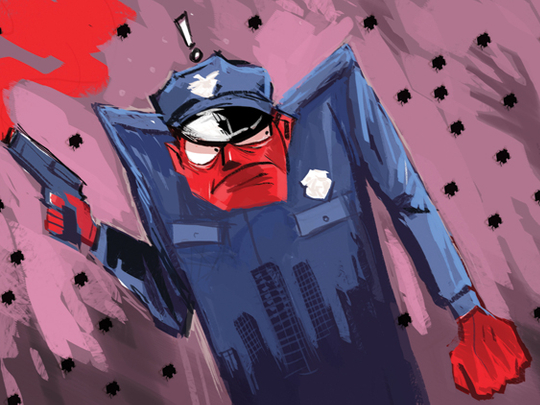
The unrest that has gripped the St Louis suburb of Ferguson, Missouri would appear to be very far removed from the Middle East, but that is not necessarily the case. One of the most striking aspects of the week of racially-tinged violence there has been the sight of a local American police force looking, and acting, a lot like an American army unit deployed in Iraq or Afghanistan. It is a story of America’s post-September 11 paranoia and the ways in which it has filtered down to the local level.
In the months and years after the terrorist attacks, a consensus emerged around the United States that state and local officials needed to be better prepared against potential threats. States, cities and towns became focused on “homeland security” (a term that barely existed in the American lexicon prior to 2001).
On one level this made sense. Few would deny that major cities like New York, Washington or Los Angeles constituted potential targets and that their law enforcement and public safety officials needed to be better prepared. It is a long way from that common sense beginning to equipping small-town police departments like a small country’s army, but this is precisely the image many Americans have spent the last week watching as the unrest in Missouri has unfurled across the nation’s television screens.
The unrest in Missouri was touched off by the latest in America’s long line of shootings of an unarmed young black man by a police officer. What caught the attention of people across the country was the police reaction to demonstrations and unrest that followed the teenager, Michael Brown’s, death. The firepower deployed to intimidate the protestors might have been familiar to demonstrators in Bangkok, Cairo or Athens but it was a far cry from what most Americans are accustomed to seeing on their streets.
In many parts of the country the first reaction was to observe that rioting and looting are bad, but that the police response was way out of proportion to the problem and seemed mainly to be making things worse. The second reaction was to wonder why local cops in a St Louis suburb had things that looked like small tanks in the first place. The answer is that in the years after September 11 the government made it easy for local officials to acquire things that previously had been available only to the military and a few big-city police departments. In some cases the Department of Homeland Security (itself a post-September 11 creation) simply gave local authorities money to buy this stuff.
Pentagon programme
In addition the Pentagon hugely expanded a programme under which surplus military equipment is sold to local law-enforcement agencies at bargain-basement prices. According to Newsweek, for example, police in a small Connecticut town recently used that programme to acquire a $730,000 (Dh2.7 million) land mine-proof armoured vehicle for a mere $2,800. The magazine also cited a Georgia hamlet with barely 2,700 inhabitants whose police department used the same Pentagon programme to purchase four grenade launchers.
Which still begs the question: “Why?”
The Pentagon’s surplus transfer programme was originally intended to help local cops fight drug trafficking. In post-September 11 America, however, no public official wants to be left explaining to voters why he or she was unprepared for any event however unlikely that particular event might have been. That creates a huge incentive to buy fancy military and anti-terrorist gear, especially when Washington is offering it at a steep discount. There is also a popular theory that because police departments tend to hire a lot of ex-military people (there are no government statistics specifically tracking how many police officers come into the job with military experience, but anecdotal accounts from around the country put the figure at 50 to 60 per cent) the combat-ready gear and invading army-style tactics on display in Ferguson and so many other places are often cases of ex-soldiers simply following familiar procedures.
The problem, of course, is that the police and the military are not the same thing. They serve different purposes and are supposed to deal with civilians in very different ways under very different conditions. Equipping police like soldiers encourages them to act like soldiers and results in the stories now appearing all over the American media of police Swat (Special Weapons and Tactics) teams breaking down doors and deploying dozens of heavily-armed officers to make relatively routine arrests.
Americans still say that September 11 “changed everything,” by which they mean ‘everything’ in the world of politics, diplomacy and military affairs around the globe. Taken that broadly the statement is absurd, but when seen narrowly — in terms of the US itself — it contains more than a little truth.The militarised police over-reaction in Ferguson, Missouri was not caused by September 11, but 9/11 did much to make it possible. The events of the last ten days are a reminder that, even now, changing that dynamic is going to be very, very difficult.
Gordon Robison, a longtime Middle East journalist and US political analyst, teaches political science at the University of Vermont.









